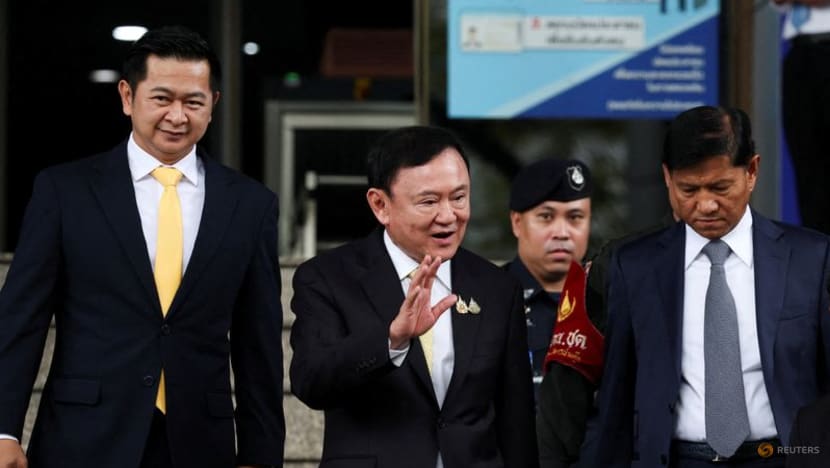Commentary: Thailand’s elite status quo prevails – for now
The next few weeks will decide if the Shinawatra family’s clout persists, says former foreign correspondent Nirmal Ghosh.

Former Thai prime minister Thaksin Shinawatra leaves after a Thai criminal court cleared him of charges in a lese majeste case on Aug 22, 2025. (Photo: Reuters/Chalinee Thirasupa)

This audio is generated by an AI tool.
SINGAPORE: The acquittal of controversial former Prime Minister Thaksin Shinawatra of lese majeste charges last Friday (Aug 22) preserves Thailand’s elite status quo – but only for now.
The sword of Damocles still hangs over the family. Mr Thaksin, 76, is due for another court verdict on Sep 9, on charges that his 2023 detention in a VIP wing of a police hospital, instead of jail, did not amount to serving the sentence he was handed for abuse of power and conflicts of interest.
His daughter Paetongtarn Shinawatra, appointed in August 2024 as Thailand’s youngest leader – she was 37 then – is herself in a precarious position. She was suspended last month over a leaked phone call with former Cambodian Prime Minister Hun Sen, in which she seemed deferential while discussing a border conflict between the two countries.
That call, leaked by Mr Hun Sen, exacerbated the crisis, which erupted into armed clashes now only paused in an uneasy ceasefire. Ms Paetongtarn still faces an ethics violation accusation over the call. Roughly a year ago, her predecessor Srettha Thavisin lost his premiership also over an ethics issue.
STAGNATION
Meanwhile, the uncertainty spawned by the country’s seemingly endless political dramas continues to take its toll on the economy, with official full-year GDP growth projected to come in at 1.8 per cent to 2.3 per cent. In contrast, Vietnam is growing at over 7 per cent; the Philippines at over 5 per cent.
It is common to hear Bangkok-based analysts and corporate executives complain about the country’s faltering competitiveness. Years of military rule followed by years of political engineering and re-engineering have squandered Thailand’s advantages.
Tourism, a trusted but ageing growth engine, has stalled, with arrivals down around 7 per cent thus far this year.
“In a country of 70 million where a handful of men can remove an elected government time and again, there can be no stability and progress, only tension and regression,” Dr Thitinan Pongsudhirak, director of the Institute of Security and International Studies at Chulalongkorn University’s Faculty of Political Science, wrote on Aug 22 in the Bangkok Post.
“We cannot live like this in Thailand, under constant manipulation, concoction and subversion. If we do, the country will only see more decay and stagnation,” he told me separately.
SHINAWATRAS ON THE WANE
If Mr Thaksin had been judged guilty under Thailand’s Article 112, which prohibits criticism of the monarchy, he could have received a jail sentence of up to 15 years, in a possible coup de grace for the Shinawatra brand, whose influence is considerably weaker than it once was.
The verdict was thus only the latest in a checkered record for the billionaire who lost his prime ministership in a coup d’etat in 2006 by the country’s powerful military. His sister Yingluck Shinawatra, who was elected in 2011 as Thailand’s first female prime minister, was ousted in 2014.
The lese majeste charge stems from an interview he gave to a South Korean newspaper 10 years ago, in which he said he believed the 2014 coup d’etat that had deposed the elected government of his sister had been instigated by "some people in the palace" and members of the privy council, the King’s 19-member advisory body.
The court on Friday ruled that the evidence was insufficient to prove that Mr Thaksin’s statements amounted to defamation or insult of the monarchy.
According to reports, the conviction rate for lese majeste cases is around 80 per cent. Anyone can file a lese majeste complaint, and police are bound by law to investigate; rights groups say the law has been increasingly used as a tool to stifle dissent against the status quo.
A year ago, in August 2024, Thailand’s powerful Constitutional Court ordered the dissolution of the reformist Move Forward Party which had among other things called for amendments to the law, and won the most seats and votes in the 2023 election but was blocked from forming a government.
A Jun 19-25 poll by NIDA (National Institute of Development Administration), one of Thailand’s more trusted agencies, showed that support for Mr Thaksin’s Pheu Thai Party has plunged to 11.52 per cent from 28.05 per cent. Ms Paetongtarn’s personal approval has also fallen to 9.2 per cent from 30.9 per cent in the first quarter. In contrast, the opposition People’s Party and smaller coalition partners gained ground.
The end of the Shinawatra brand would conceivably open up more space for other potentially more popular politicians and parties to sweep to power in elections in a repeat of a cycle that has dogged Thailand ever since Mr Thaksin himself won an election in a landslide in 2001.
That Mr Thaksin was acquitted thus extends the life of the current dispensation which analysts have likened to an elite "grand bargain" in which the former prime minister, whose one-immense popularity was seen as a challenge to the royalist establishment, about faced to join forces with it, thus becoming an ally of rather than a challenge to Thailand’s royalist elites.
Pavin Chachavalpongpun, professor of Southeast Asian Studies at Japan’s Kyoto University, told me the acquittal appears to be “the final confirmation of a discreet political arrangement”.
Since Mr Thaksin’s return in 2023 from 15 years of self-exile, shortly after Pheu Thai joined with several others to form a coalition government after many weeks of political deadlock, he has been careful to display his loyalty to the monarchy, signalling capitulation to the royalists who once threw him out of power. At court on Friday, he wore a yellow tie; yellow is the official colour of Thailand’s monarchy.
ANOTHER ELECTION
The next few weeks may decide if the family’s clout persists. The verdict on the ethics case against Ms Paetongtarn, who on her suspension was demoted to a minor Cabinet portfolio, is due this Friday (Aug 29). If she is judged guilty and has to resign, Thailand’s parliament will have to find yet another new prime minister.
Many analysts believe another election – the last one was only in 2023 – is not long in the offing. “People are calling for more progress and greater government accountability,” Titipol Phakdeewanich, a political science lecturer at Ubon Ratchathani University, told me in an interview.
The machinations in Bangkok thus only underscore a larger imperative. While Thailand’s power equilibrium may hold for now, it is inherently shaky. The country will likely remain hostage to political uncertainty for the foreseeable future – something it can ill afford in an era of new global disequilibrium and rising competition in a volatile region.
Nirmal Ghosh, a former foreign correspondent, is an author and independent writer based in Singapore.


















